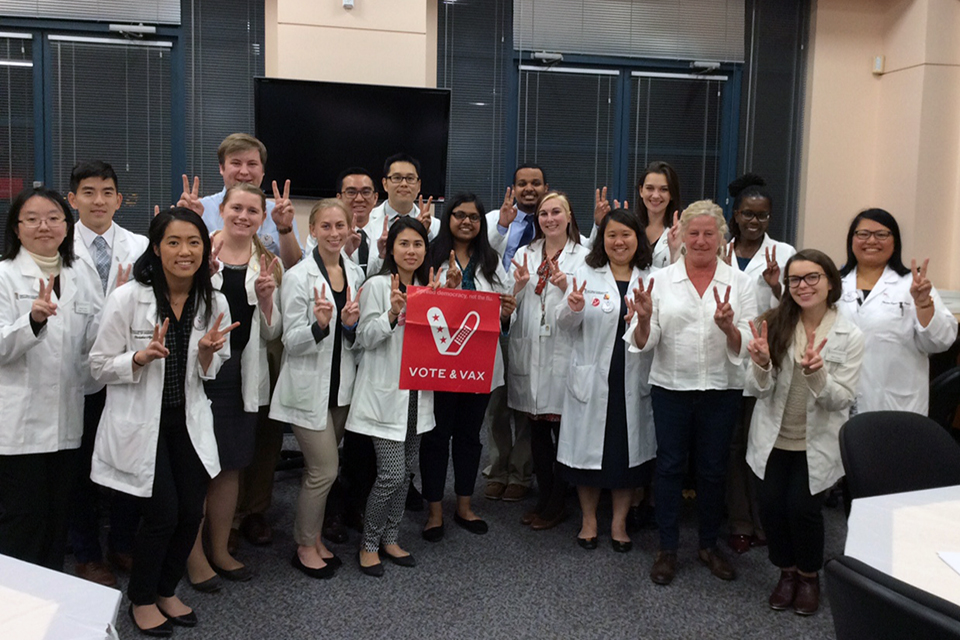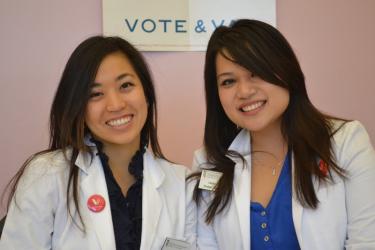Student Pharmacists Keep University Community Healthy During Flu Season
APhA-ASP’s “Operation Immunization” partners with Walgreens to organize annual flu clinic to provide seasonal flu shots to faculty, staff, and students across campus.
By Malissa Carroll
October 2, 2013
On September 24, the University of Maryland School of Pharmacy hosted its Annual Flu Clinic to provide a convenient way for faculty, staff, and students to receive influenza vaccines and to educate the campus community about this important vaccination. Members of the American Pharmacists Association Academy of Student Pharmacists’ (APhA-ASP) “Operation Immunization” partnered with Walgreens to coordinate this event.
“As health care professionals, we play a vital role in advocating for wellness and prevention, which includes vaccinations,” says Cherokee Layson-Wolf, PharmD, CGP, BCACP, FAPhA, associate dean for student affairs and associate professor in the Department of Pharmacy Practice and Science (PPS). “It starts with receiving a flu shot ourselves so that we can serve as role models for patients. We also get the added benefit of protecting ourselves and those around us against the flu.”
The flu is a contagious respiratory illness caused by influenza viruses that infect the nose, throat, and lungs. Symptoms associated with the flu can be mild to severe, and include fever, cough, sore throat, runny or stuffy nose, muscle or body aches, headaches, and fatigue. More than 200,000 people are hospitalized for flu-related complications each year.
The best way to prevent the flu is by getting a flu vaccine each year.
“I attended the Annual Flu Clinic to help protect myself and my family against the flu,” says Jennifer McGinley, associate director of alumni affairs at the School of Pharmacy. “Having the clinic at the School made it extremely easy and convenient for me to receive my vaccine. It was also great to be able to support our student pharmacists as they train for their future careers.”
Sarah Tom, PhD, MPH, assistant professor in the Department of Pharmaceutical Health Services Research (PHSR), adds, “I got my flu shot to help keep myself and those around me, both at home and in the office, healthier this flu season. I was very pleased to see our students who worked at the clinic participating in this important public health effort.”
According to the Centers for Disease Control and Prevention (CDC), all individuals age six months and older should get vaccinated against the flu each year. It is particularly important for certain groups of individuals to get vaccinated, including those five years and younger, those 65 years and older, pregnant women, and people with certain medical conditions, such as asthma, diabetes, and chronic lung disease.
“I have assisted with organizing the Annual Flu Clinic at the School of Pharmacy for the past two years, and it has been a very fulfilling experience,” says Sohani Patel, third-year student pharmacist and chair of APhA-ASP’s Operation Immunization. “This clinic is beneficial for faculty, staff, and students because it provides them with a convenient location to receive their flu vaccine without taking too much time from their already busy schedules, and ensures that they have the knowledge they need to protect themselves as well as their patients, colleagues, family, and others with whom they might interact.”
In 2012, Operation Immunization partnered with other health care professionals, including nurses and members of state and local health departments, to coordinate several flu clinics in Maryland that led to more than 770 patients receiving their annual flu shot. Supervising this particular clinic was Tony Kearney, PharmD, a preceptor for the School of Pharmacy who has been instrumental in teaching student pharmacists how to correctly administer vaccines and providing them with opportunities to apply this valuable skill.
If you were unable to attend the Annual Flu Clinic at the School of Pharmacy, there is still time to get vaccinated. Flu vaccines are offered at a wide range of locations, including doctors’ offices, health clinics, health departments, and pharmacies.


